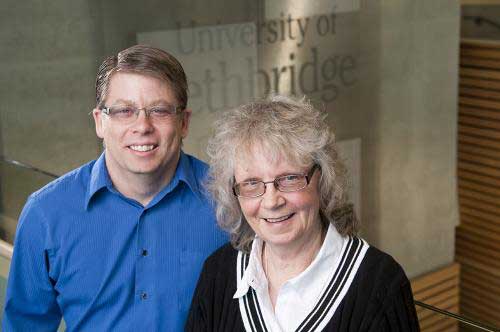In 1991, Brian Mulroney was Prime Minister, the World Wide Web became publicly available on the Internet, the Soviet Union dissolved, Super Nintendo was released in North America and the Management Co-operative Education program at the University of Lethbridge, the first program of its kind in Alberta, was born.
"Co-op combines the theoretical knowledge of the classroom with hands-on education found in the workplace. Experiential learning is one of the best ways to develop new skills," says Dr. Mary Thompson, who became the program's director in its second year and helped shape it for the next 10 years.
With her background as a professional recruiter, Thompson introduced a client-centred approach to the program, which ensured it met the changing needs of the business community.

"We explored what we could do for employers," she says. "And that focus also ensured success for our students because we prepared them well with workshops and one-on-one counselling before sending them to employers."
Thompson stresses that the program was built and refined based on scholarly research.
"We researched business trends and learning curves," she says.
As a result of that research the University of Lethbridge was the first co-op program in Western Canada to move away from the standard four-month work terms to longer work placements, ranging from eight to 16 months.
"We discovered that four months was just not long enough," says Thompson. "We were able to extend the placements because we had the hard evidence that proved their value. We were leaders in removing rigidity from the program, which was really advantageous for both students and employers."
It was also under Thompson that the co-op office started providing placements for its own students as junior administrators in the program.
"We were unique in that we used co-op in co-op," she says with a smile.
Steve Craig, the current director of the program, was one of those students who did his work placement in the U of L co-op office.
"We just never let him leave," she says. "He's doing a fabulous job now as director."
Co-op continues to work well for students and employers.
"The real beauty of the program is that it is multi-pronged," says Craig. "Co-op is more than a job experience; it can really broaden a student's horizons. Students benefit from having mentors in their workplace, obtaining work experience, making valuable connections in their industry and finding their fit. They also bring what they have learned back into the classroom, which enriches learning for other students."
Co-op placements also enable students to explore possible career directions.
"My co-op placement launched my career in the oil-and-gas industry. I was able to try on a business that I really knew nothing about," says Thomas Latta (BMgt '97), who was hired full time after his placement and is now manager of Operations, Accounting and Finance Solutions for Enerplus Corporation in Calgary. "I discovered I really liked the work and the industry. The placement helped me discover what the industry was all about and gave me a career direction."
Students have worked locally, provincially and internationally in places as far afield as France, Ireland, Ghana, Botswana, Malaysia, Vietnam, South Africa and India.
"The lower cost of living, as well as the uniqueness and relevance of emerging economies, make it interesting and possible for students wanting to do an international placement," Craig says.
Over the past 20 years, participation in the program has grown.
"In its first year co-op had three students," says Craig. "In 2010, more than 200 work terms were completed by students in the Faculty of Management."
For 20 years co-op has continued to develop and maintain successful relationships with businesses across the country and beyond.
"The relationships are important," says Craig. "We are pleased that alumni of our program think so much of it that once they are in positions to do so, they hire U of L co-op students."
Employers benefit from co-op, too. Businesses can use co-op placements to fill short-term needs and work with prospective employees before making a long-term commitment. For many companies, co-op students have become part of their recruiting strategy.
"The companies I've worked for consider co-op students a key part of staff development," says Latta. "At Enerplus, we are building our co-op component and recognize the value in seeing prospective employees at work before we hire them permanently. If we have an open position, we will look at our co-op students first because with them we already know there is a good fit."
Co-op continues to be a win-win-win situation for students, businesses and the University.
"It provides employers with motivated and intelligent employees now and potentially for the future, while offering students an opportunity to learn and develop as professionals and determine a career fit," says Craig. "I see the value of co-op continuing for everyone involved."
